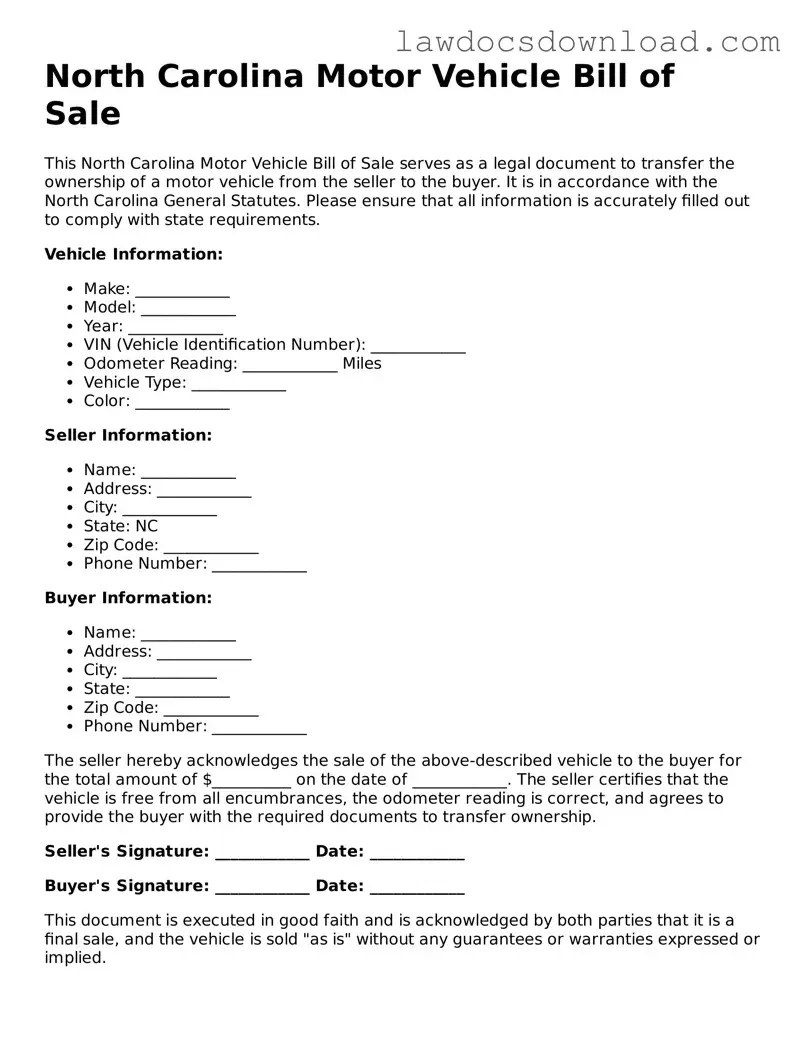The Vehicle Title Transfer form, often utilized in the process of buying or selling a vehicle, bears a strong resemblance to the North Carolina Motor Vehicle Bill of Sale. Both these documents serve the critical function of officially recording the change of ownership. The Vehicle Title Transfer, however, specifically updates the vehicle's legal title to reflect the new ownership, while the Bill of Sale acts as evidence of the transaction, detailing the agreement between buyer and seller.
Another related document is the Warranty of Vehicle form. This document, like the Bill of Sale, is used in the sale of a vehicle but focuses on the condition of the vehicle. It guarantees the current state of the vehicle, outlining any warranties or representing the sale as "as is" without warranties. The North Carolina Motor Vehicle Bill of Sale may contain similar declarations but is primarily concerned with proving the sale occurred and the terms of that sale.
The Odometer Disclosure Statement is also akin to the Motor Vehicle Bill of Sale in its role in the vehicle sale process. It is specifically required to document the accurate mileage of a vehicle at the time of sale to protect buyers from odometer fraud. While the Bill of Sale includes information about the transaction and the parties involved, the Odometer Disclosure is exclusively focused on the vehicle's mileage, making it a complementary document rather than a standalone agreement.
A General Bill of Sale is applicable for a wide range of personal property transactions, not just vehicles. It resembles the North Carolina Motor Vehicle Bill of Sale in structure and purpose, documenting the details of a transaction. However, the General Bill of Sale is not limited to vehicles; it can include sales of equipment, furniture, or other personal property, making it broader in use compared to the more specialized Vehicle Bill of Sale.
The Promissory Note for Vehicle Sale is another document with similarities to the Bill of Sale. This note outlines the buyer's promise to pay a specific amount for the vehicle, often in installments. While it indicates the sale like the Bill of Sale, its focus is on the terms of payment rather than the transaction details. The Promissory Note is a crucial document for sales where the buyer does not pay the full amount upfront.
The Sales Agreement for Motor Vehicles offers a more detailed and comprehensive approach to documenting a vehicle sale than the Bill of Sale. It includes not only the sale's specifics but also comprehensive terms and conditions of the sale, such as warranties, delivery details, and payment plans. The North Carolina Motor Vehicle Bill of Sale serves as proof of the transaction, whereas the Sales Agreement outlines the entire agreement between buyer and seller.
Lastly, the Lease Agreement for Vehicles shares some similarities with the Motor Vehicle Bill of Sale, particularly in transactions where the vehicle's ownership might not change hands immediately. Though primarily used for leasing vehicles rather than selling them outright, the Lease Agreement records the terms under which one party agrees to rent a vehicle from another. The structure and purpose align with the Bill of Sale in that they both formalize an agreement between two parties, but one leads to ownership while the other typically does not.

